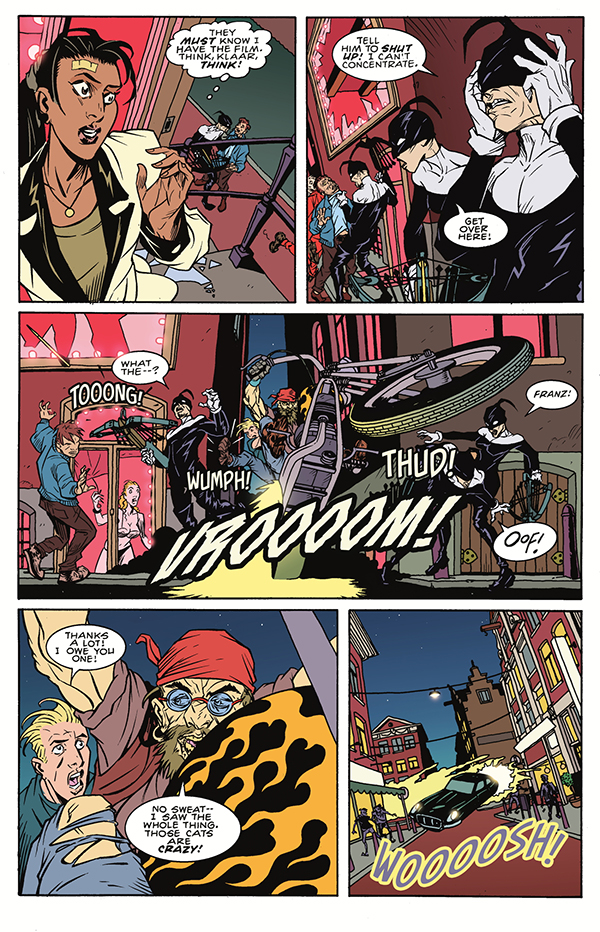Story and art: Arnold and Jacob Pander
Dark Horse, December 2019
SOMEBODY MUST THINK IT’S FUNNY to put lies in the news to bamboozle the public, though we don’t know who, because it’s secret. “One thing’s for sure,” hero Hans Nobel muses as he spirals down a toxic drain into the sea, “the truth doesn’t hurt nearly as bad as the lie.”

Such moments in this 416-page thriller by the Pander Brothers illustrate in a dozen different ways the mind-bending experience we all face living in the current reality shaped by American free-market capitalism and dominated by what they call the “multi-nats.” Hans is always kickstarting himself to face the dire situation and act, first to merely “opt out,” and later to take an active hand to knuckle down against the bad guys. “I’ve got to do something!” he bursts, like many today, desperately bent on stopping the madness. Resistance, conspiracy, sabotage, and suave deception play out on both sides. I believe in a better way is the ever-present theme.
One might think peaceful Holland should be safe from corporate domination backed by private security forces against a growling public as portrayed here, yet this is after all where the liberal model of capitalism originated, before migrating to England with social-contract philosopher John Locke—on the boat with the new royal couple William and Mary after the Glorious Revolution in 1688—bringing the liberal ideal that set parliamentary predators free to harvest individuals one at a time into their democratic machines. We know the grimy way that ended up in merry England in the age of the robber barons, but generally miss the broader ravaging of the world’s resources and people, scrambling for timber, minerals, rubber, and cheap concentrated labor in exportable products.
A wordless subplot in sepia tones expands this aspect of the tale on an unnamed island, glimpsing the broader exploitation of other peoples in remote locations, outgunned by modern weaponry. It’s easy to hate white people for this long criminal history ongoing today, but race is not the issue. It’s all about the money, honey, whoever you are.
The plot for revolution in the opening New York City scenes struck me at first as implausible. Do people really believe democracy, meaning free elections, is the answer, when it’s obviously democracy that got us into this mess? And how can we believe that ousting the bad apples will return us to a golden age of American values, where individual rights are respected, while those few with big guns and big money keep on freely prospering? And how is it possible to believe information revealing the crimes to motivate people to rise up will change a thing without an intelligent plan to reorganize the political economy? The charming villain Thexxol in the story bribes government officials, rails against regulations, and always has his way, indicating clearly the problem here is the absence of a responsible state strong enough to stop him. The current Establishment involves the corruption of the state, so the hero never looks that direction.

Soon, though, I realized with substitutions of names and faces, these fumbling assumptions and confrontations actually exist, occurring today in various countries around the world, and yesterday, and every decade since at least the beginning of the twentieth century, when conspiracies abounded aiming to establish a right government in the world. Most of the displayed turmoil in recent decades has been the work of the United States of America Central Intelligence Agency, destabilizing and overthrowing governments, assassinating leaders unfriendly to economic free enterprise, where the power of money is the only determinate value, and committing sabotage in provocative paramilitary operations, even bombing public places in order to blame enemies. Plausible deniability is the first prerequisite for any project, someone else must be blamed, but blaming others is sometimes the whole purpose. Sound familiar? Yes, the CIA came to America in the 1970s, and inflamed the political culture of deceit, disinformation, and paramilitary posturing in the country since then, through the 1980s, 1990s, 2001, and now. As the late William Blum aptly summarized: “No matter how paranoid or conspiracy-minded you think you are, what the CIA is actually doing is always worse than you imagine.” DISSIDENT X helps us imagine it.

Similar to the opt-out revolutionaries in the story opening, the CIA by 1952 had established covert paramilitary terrorist cells in over 47 countries, in addition to widespread political cells intent on disrupting governments through disinformation, dirty tricks, and covert funding. After Congressional investigative committees finally revealed some of the horrors and tried to audit the CIA in 1975, President Carter severely cut the budgets in both the CIA and the military, creating a host of unemployed operatives and sympathizers in high offices who flocked to support the Republicans and the Reagan/Bush campaign in the upcoming presidential election, and this cabal of powerful enemies, skilled in lies and secrecy, successfully overthrew the American government to keep doing business as usual.
DISSIDENT X may be read as a cautionary tale, showing how not to try to save the world. The illustration is vibrant and fast-paced. The signature Pander Brothers art gleams, finely detailed, yet opaque enough to never see the bricks in the traditional Amsterdam facades, making a slick style that flirts with cubism, every panel a little masterpiece. One delightfully strange perspective looks at characters talking on a romantic bridge over a canal viewed from beneath the belly of a cockroach on the street across the way.
The text is characteristically smart and true, and sometimes amusing. “I just want to get past this self-destruction,” hero Hans murmurs during a riot at the Amsterdam harbor, vacillating between fear and courage, despairing the absence of a solid plan.

We do not want to abandon corporations, nor deflate the liberal traditions of individual enterprise, and liberty and justice for all, as dissident Hans Nobel so desperately wants to attain. Nor ought we to abandon kings and queens, and nobility to personally embody, empower, and protect our highest values. All these institutions and attributes must rather be appropriated and trained in a new system the world has not yet seen. Mister and Ms. Dissident X have to step into the light, abandon secrecy, and make an open conspiracy that sets a gold standard for how we want to live today in a better way.
*
Acknowledgement for facts and ideas here due to William Blum, Gary Sick, Tim Weiner, Daniele Glanser, John Prados, and foundations from HG Wells, Thomas Carlyle, GWF Hegel, and Francis Fukuyama in his masterful two-volume work on political order (2011, 2014), who gave me the story of exiled philosopher John Locke returning from Holland to England with William of Orange and Lady Mary. Essential is historian Louis Hartz in The Liberal Tradition in America (1955), who radically changed the interpretation of American history, and makes possible a leap to imagine a new future.

